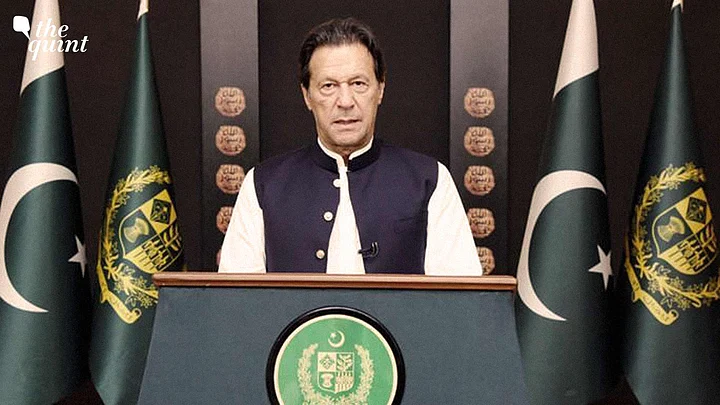Politics in Pakistan refuses to escape headlines.
The Supreme Court of Pakistan has unanimously ruled that National Assembly Deputy Speaker Qasim Suri's rejection of the no-confidence motion against Prime Minister Khan was unconstitutional.
This happened after the no-confidence motion against the Khan government was disallowed on 3 April by Deputy Speaker Suri.
Consequently, the National Assembly was dissolved by President Arif Alvi, and Khan was de-notified as the prime minister of Pakistan.
Khan went on to propose former Chief Justice of Pakistan Gulzar Ahmed's name as the caretaker prime minister of the country.
So, this is where we are at now:
A cabinet meeting had been called by Khan on Friday
Khan would also address the nation on the same day
The no-confidence vote will be held on 9 April
What's next? What can we expect from various actors involved in this constitutional crisis?
Imran Khan Will Lose the Vote
The drama that has unfolded in the past few days does not change the simple fact that the odds are stacked against Imran Khan.
The Muttahida Qaumi Movement-Pakistan (MQM-P), which had formally announced on 30 March that it was exiting the coalition government led by Khan's party the Pakistan Tehreek-i-Insaf (PTI), continues to be allied to the Opposition.
As Khan's allies rebelled against him and the no-confidence motion was moved against him on 8 March, his coalition had been (before the vote) reduced to the following:
Pakistan Tehreek-e-Insaf: 155
Pakistan Muslim League (Q): 4
Grand Democratic Alliance: 3
Balochistan Awami Party: 1
Awami Muslim League: 1
Total: 164
The opposition's numbers before the vote, according to the numbers provided by Dawn, looked like this:
Pakistan Muslim League (N): 84
Pakistan Peoples Party: 56
Muttahida Qaumi Movement - Pakistan: 7
Muttahida Majlis-e-Amal: 15
Balochistan National Party (Mengal): 4
Balochistan Awami Party: 4
Pakistan Muslim League (Q): 1
Awami National Party: 1
Jamhoori Wattan Party: 1
Independents: 3
Total: 176
When the vote happened in the opposition's "own session", despite the deputy speaker's order, it turned out that the opposition had collected 197 votes in favour of ousting the prime minister, including more than 20 rebels from Khan's own party, the Pakistan Tehreek-i-Insaf (PTI). The National Assembly has 342 seats and the magic number is 172 (majority required to form the government).
So, one thing that we certainly can expect from the National Assemly tomorrow, unless Khan has another ace up his sleeve, is that he will officially lose his government.
Shahbaz Sharif, the Next PM?
If Khan loses his government, then he officially and absolutely loses his post as prime minister (he is still hanging on to it, albeit denotified).
The man who is likely to replace him is Shahbaz Sharif, brother of former Pakistan Prime Minister Nawaz Sharif and the Leader of the Opposition in the National Assembly.
During a press conference on 30 March, Bilawal Bhutto Zardari, the chairman of the Pakistan Peoples Party (PPP) had asserted that "Imran Khan has now lost his majority" and that "he is no longer the prime minister."
He then went to say that Sharif "will soon" become the next prime minister of Pakistan.
The thing is that Sharif does not even belong to the PPP. He is actually the current president of Pakistan Muslim League (N), the party his brother founded in the 1990s.
After the Supreme Court deemed the deputy speaker's decision to call off the no-confidence vote as unconstitutional, Sharif strongly tweeted about "politics of lies, deceit & allegations" being "buried" in the country.
What happens with Sharif with respect to the post of prime minister is tricky.
According to the rules, fresh elections in Pakistan, something which Khan insisted on during his latest address to the nation, must be held after the dissolution of the National Assembly.
The Election Commission of Pakistan (ECP), however, stated that general elections are not possible in the country before October as "seven months are required to ensure a free, fair, and transparent polls."
Therefore, if Khan does lose his government tomorrow, and the tenure for Gulzar Ahmed as the caretaker PM of the country ends, what happens?
Does Sharif take over immediately? Does Ahmed's tenure continue till October? Or is Pakistan leaderless till the next elections? Or does the military intervene, despite all its assurances that it will stay away from politics?
The first option is the most likely one, given that the Supreme Court stated today that "if the no-confidence motion against the prime minister succeeds, then the Assembly will appoint the new prime minister."
Since Sharif has the numbers, we can expect him to be sworn in soon.
Watch Out for the Supreme Court
The Supreme Court of Pakistan, led by Chief Justice Umar Ata Bandial, has proven to be one of the most significant players influencing the constitutional crisis.
And the apex court has an interesting history of playing its part during similar crises in the past.
According to Dawn, the Supreme Court held in 1958 that "a successful revolution or coup d’etat was an internationally recognised method of changing a Constitution."
That created the precedent for future military coups.
Interestingly, the Supreme Court had upheld the dissolution of the Assemblies and the overthrowing of Prime Minister Benazir Bhutto in separate occasions, 1990 and 1996, under Article 58(2b) of the Pakistani Constitution.
However, according to the same Dawn report, in 1993, the Supreme Court ensured that Nawaz Sharif became prime minister, striking down then President Ghulam Ishaq Khan's order to dissolve the National Assembly.
The current chief justice even defied former Pakistan President and military chief Pervez Musharraf in 2007.
The point is that the court has, in the past, played a crucial role in crisis situations like the one we are seeing at the moment. Do not expect their interventions to end anytime soon.
(At The Quint, we question everything. Play an active role in shaping our journalism by becoming a member today.)
